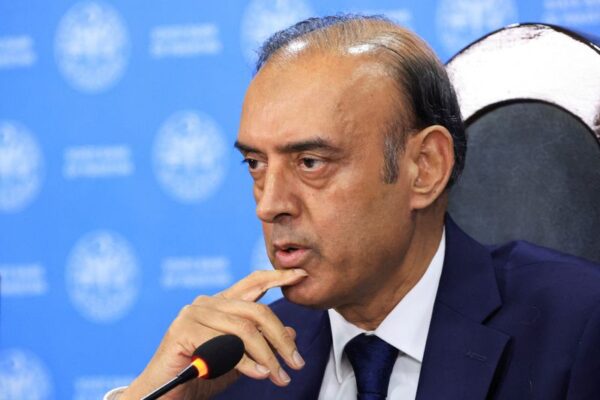Evergrande debt woes are manageable, China central bank official says
2/2 © Reuters. FILE PHOTO: The logo of China Evergrande is seen at outside China Evergrande Centre building in Hong Kong, China September 23, 2021. REUTERS/Tyrone Siu/File Photo 2/2 By Andrew Galbraith
SHANGHAI (Reuters) -The spillover effect of China Evergrande Group’s debt problems on the banking system is controllable, a central bank official said on Friday, in rare official comments on a liquidity crisis at China’s No. 2 developer that has roiled global markets.
Chinese authorities are urging Evergrande to step up asset disposals and the resumption of projects, Zou Lan, head of financial markets at the People’s Bank of China (PBOC), told a briefing, adding that individual financial institutions did not have highly concentrated exposure to Evergrande.
“In recent years, this company did not operate and manage itself well. It failed to conduct prudent operations according to changing market conditions, and it blindly diversified and expanded its business,” Zou told the briefing in Beijing.
Chinese officials and state media have been largely silent on the crisis at Evergrande, which has missed a series of bond interest payments and has $300 billion in debt, making it the world’s most indebted developer.
Zou also said property firms that have issued bonds overseas should actively fulfil their debt repayment obligations.
Evergrande has left its offshore investors in the dark about repayment plans after already missing three rounds of interest payments on its dollar bonds.
Zou’s comments came as sources told Reuters that Evergrande CEO Xia Haijun was holding talks in Hong Kong with investment banks and creditors over a possible restructuring and asset sales.
Xia had been in Hong Kong for more than two months, several sources told Reuters. Xia needed to communicate with foreign banks on loan extensions and repayments, one of the sources said.
Joining a list of property developers reeling from the debt crisis, China Properties Group Ltd said on Friday it had defaulted on notes worth $226 million.
Another Chinese developer, Xinyuan Real Estate Co’s, avoided a default on a maturing dollar bond on Friday, saying in a Singapore Exchange (OTC:SPXCY) filing that bondholders had agreed to an offer to accept new bonds and cash in exchange for maturing notes.
Xinyuan said that holders of more than 90% of the company’s $229 million notes due Oct. 15 had agreed to the exchange, which would see it deliver new bonds worth $205.4 million and $19.1 million cash.
Xinyuan’s 14.5% September 2023 bond crashed nearly 30% on Friday to trade at 58.35 cents, according to data provider Duration Finance.
The agreement follows warnings from other developers that they could default on their bonds, while still others have taken steps to delay payments in the wake of Evergrande’s troubles.
Evergrande, with 1,300 real estate projects in more than 280 cities, missed a third round of interest payments on its international bonds this week.
However, in a separate statement filed to the Shenzhen Stock Exchange, Evergrande said it would pay interest coming due on Oct. 19 on a yuan-denominated bond it issued in 2020.
PBOC URGES SPEEDY ASSET SALES
At the Friday briefing, Zou said Evergrande should step up asset disposals and the resumption of project building, for which authorities will provide financing support.
Some lenders have had “misunderstandings” about the central bank’s debt control policies, causing financial strains for some developers, as some new projects were unable to get loans even after repaying existing loans, Zou said.
“This short-term extreme reaction is a normal market phenomenon,” he said.
Chinese developers face more than $500 million in coupon payments on their high-yield bonds before the end of this month. Refinitiv data show coupon payments by Kaisa Group Holdings and Fantasia Holdings are due this weekend.
“In some cities, the property prices surged too fast, causing the approval and issuance of personal mortgages to be restrained,” Zou said, referring to the first nine months of this year.
“Once housing prices stabilise, the supply and demand of mortgages in those cities will be normalized too,” he said.
FRESH SETBACKS
Still, Evergrande suffered fresh setbacks on Friday with sources telling Reuters that Chinese state-owned Yuexiu Property pulled out of a proposed $1.7 billion deal to buy the company’s Hong Kong headquarters building over worries about the developer’s dire financial situation.
Evergrande has been scrambling to divest some assets to repay creditors knocking on its doors and the collapse of the talks shows the difficulties it is facing.
Adding to its woes, Hong Kong’s audit regulator said on Friday it was investigating Evergrande’s 2020 accounts and their audit by PwC because it had concerns about the adequacy of reporting on whether it could continue operating as a going concern.
Evergrande bonds fell following the Reuters report. The company’s 8.75% June 2025 bonds slumped more than 6% to trade at a discount of more than 80% from its face value, according to data provider Duration Finance.
BOND SLUMP DEEPENS
Apart from Xinyuan, Duration Finance data showed other developers’ bonds deepening their rout. Sinic Holdings Group’s 10.5% June 2022 bond dived more than 20% to just 12.25 cents, and Ronshine China Holdings’ February 2022 bond fell more than 6% to 68.35 cents.
Moody’s (NYSE:MCO) downgraded Risesun Real Estate Development Co Ltd to B1/B2, with a negative outlook.
Spreads on Chinese high-yield corporate dollar bonds touched a fresh record late Thursday evening U.S. time, having nearly tripled since late May, while investment-grade spreads remained near their widest in more than two months.
Worries of contagion have also hit property developers’ shares this week. On Friday, an index tracking A-shares in the sector gave up small gains to end down 0.1%, lagging a 0.38% gain in the blue-chip index and taking losses since Tuesday to 4.5%.
China has been ramping up property market curbs since late 2020, introducing new measures to closely monitor and control developers’ debt levels.
But with economic growth cooling and new construction starts slowing, speculation has been rife over whether it will start relaxing those restrictions, as was the case during previous downturns.[ECILT/CN]












 Bitcoin
Bitcoin  Ethereum
Ethereum  Tether
Tether  XRP
XRP  USDC
USDC  Solana
Solana  TRON
TRON  JUSD
JUSD  Figure Heloc
Figure Heloc